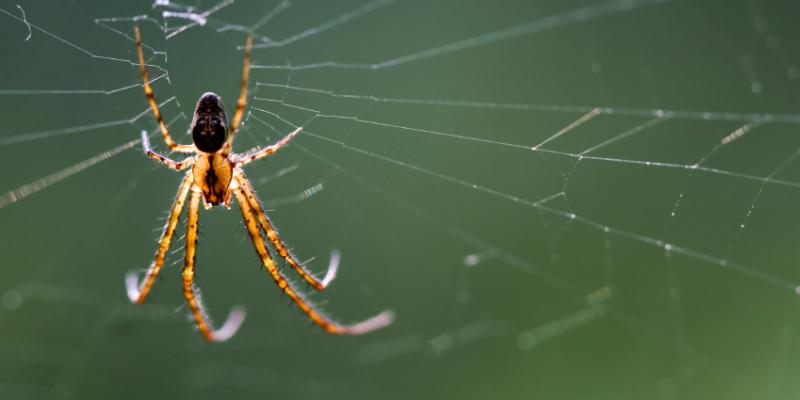
SPIDERS! IPM has had a surge of spider related calls this past month. It is unknown as to why the spiders have been on an incline this year, with reports of larger than normal amounts of webs, in door ways, vents, eves, bushes , windows, to finding many, creeping around the interior of homes.
The most common being brought into our office in jars and spotted in homes is a garden, funnel weaving spider that is native to the NorthWest:
Species Tegenaria domestica – Funnel Weaver
- Other Names: Common House Spider (in the Pacific Northwest), Barn Funnel Weaving Spider, Drain Spider (becomes stuck in sinks and can’t crawl out)
- Coloration of the domestic house spider varies from grayish-brown to dark chocolate brown. Most domestica appear at first glance as smaller, darker spider (when compared to its cousins). It has banding or stripes on its legs (which can be very faint), but will distinguish it from the hobo spider.
- Habitat: Often darker areas, such as flower beds, wood piles, and areas where it can weave a funnel-web. When it is found in homes, it often is found in the basement, in the darker recesses such as closets and corners. It is a nocturnal spider, so generally it is discovered when the lights are turned on and the spider darts for cover (and/or its web). These spiders are not seasonal, but rather, can be found year round (if in a survivable environment). They are generally more scared of you than you are of them, but will show aggression if cornered or feels threatened. This spider is not dangerous to people, but is often confused with the T. agrestis (Hobo Spider), which may or may not be dangerous. If you are unsure of the exact species, just be mindful of this confusion, and use caution when dealing with the spider.
Which brings us to T. Domestica’s bad boy cousin:
Hobo SpiderTegenaria agrestis – Hobo Spider
Aggressive house spider (incorrect name, but commonly used). Please see below.
A common misconception is that agrestis means “aggressive”, giving it the name “aggressive” house spider. This spider is not aggressive, and would rather flee than fight, unless it feels threatened without the option to escape. (This misconception is often used to help fuel fears about the potential hazards of this spider.)
- Size: All measurements are for only the body, and do not include the legs.
- Female: 11-15 mm (1/2 – 2/3 inch);
- Male: 8-11 mm (1/4 – 1/3 inch).
- Identification: Very difficult to ID from photos. The actual spider (not a photo) needs to be examined by an expert for a definite identification. Often your local university extension office, agricultural office or Interstate Pest Management, will have resources to assist you (with identification and control).
There is no dimorphism in color or markings. The appearance of hobo spiders is not unattractive, but their coloration is rather subdued, being a mixture of brown and rust earth shades. They have a herringbone pattern on the top side of their abdomens. Although most Agelenidae have very “hairy” looking legs, the legs of this spider are fairly smooth.
Often, it is easier to determine if the spider is not a hobo, rather than determine with certainty that it is a hobo. Both have been identified by our office to be fairly common in the Portland, Clark County and Cowlitz County areas. Although, Tengenaria Domestica is much more common than the actual Hobo Spider.
If you are having a concern about keeping these furry friends out of your home or have seen recent activity, IPM would be happy to give you a free estimate today! There is a one time treatment option that comes with a limited 3 month warranty available or a Eco-Science program that covers all of your standard nuisance pests including the spiders, that has an initial set up fee and a minimal charge quarterly. All in-between calls are no charge!
Call us TODAY at 360-218-2463 for prices and appointment availability!
PS. This is what troops face in IRAQ….
Camel Spiders….Gotta love the USA!